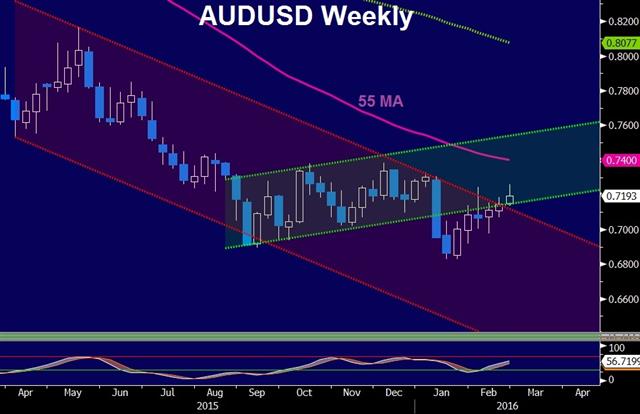Why the Market Turned
The intraday reversal in many markets on Wednesday highlighted two dominant undercurrents. On the day, CAD finished as the top performer while GBP lagged to another long-term low. Data on Australian capex spending is due later. In the Premium Insights, EURJPY short was closed with a 345-pip gain earlier today (opened on Feb 11) and later the GBPUSD short was closed at 1.3915 (opened on Feb 23) for a 215-pip gain.

The theme in early trading was risk aversion, that means yen strength, stocks weakness & rallying bonds. Midway through US trading, it completely reversed because of two factors: 1) The weakest Markit services PMI since Oct 2013 2) a reversal in oil.
On the surface, it's strange to credit a rally in USD/JPY to weak economic data but it highlights the market drivers at the moment. Normally, the dollar would struggle on soft data because it would mean fewer rate hikes and less yield for bond buyers. Once again, the old "bad news is good" is back.
What's changed is that bond flows are no longer dominant. The market is now so comfortable with the idea that this Fed hiking cycle will be limited to less than 75 bps of hikes and that central bank buying will permanently skew rates lower, that the usual reaction is flawed. It's assumed that 10-year rates will stay near the current range.
So what matters is Fed perception. The stock market worried about the Fed making (another?) policy mistake. If the Fed remains sidelined, even in a middling US environment, US stocks may be good alternative. However, if they hike, then there could be trouble. So soft economic data is welcomed at the moment because it makes it less likely the Fed will deliver a hawkish message in March. That was underscored by the Fed's Kaplan who characterized US growth as sluggish on Wednesday.
The second undercurrent is oil. The turnaround today was highly correlated with oil. It came after the EIA inventory data showed less supply growth than API numbers yesterday. WTI crude had fallen as low as $30.89 before rising back to $32.15. Momentum is a major factor in the oil market on the intraday swings and the correlation with risk assets is extremely high because the market is increasingly worried about the potential fallout of oil company bankruptcies and recessions in oil exporting countries. The services sector data also underscored that consumers are reluctant to spend despite cheaper gasoline prices.
Looking ahead, a separate (big) question we're trying to answer is how developed commodity exporting countries will fare in the resource bust. Australian economic data has been surprisingly robust for the past six months despite a major drop in resource capex. The sequential q/q decline in spending has been -2.6%, -5.3%, -4.4% and -9.2%. Fourth quarter data is due at 0030 GMT and expected to show another 3.0% q/q decline. These numbers have been a major driver in the past, especially planned capex for Q1.
Other events on the calendar include speeches from Bullard (0000 GMT) and Kiuchi (0130 GMT).
| Act | Exp | Prev | GMT |
|---|---|---|---|
| Markit PMI Composite (FEB) [P] | |||
| 50.1 | 53.2 | Feb 24 14:45 | |
| Markit Services PMI (FEB) [P] | |||
| 49.8 | 53.5 | 53.2 | Feb 24 14:45 |
| Fed's Lockhart speech | |||
| Feb 25 13:15 | |||
| FOMC's Williams speech | |||
| Feb 25 17:00 | |||
Latest IMTs
-
USDJPY Jumps on Dovish Picks
by Ashraf Laidi | Feb 25, 2026 11:40
-
Gold $5000?
by Ashraf Laidi | Feb 24, 2026 14:21
-
DXY Net Longs
by Ashraf Laidi | Feb 23, 2026 14:20
-
Iran Polymarket & Fed Odds
by Ashraf Laidi | Feb 20, 2026 11:27
-
Gold, Iran & Oil
by Ashraf Laidi | Feb 19, 2026 16:40







